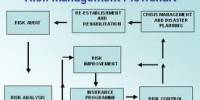Operations management involves planning, organizing, and supervising processes, and makes necessary improvements for higher profitability. The adjustments in the everyday operations have to support the companies or organization’s strategic goals, so they are preceded by deep analysis and measurement of the current processes. It is concerned with converting materials and labor into goods and services as efficiently as possible to maximize the profit of an organization. Operations management teams attempt to balance costs with revenue to achieve the highest net operating profit possible.
Operations management includes the planning, designing, and supervising activities carried out while developing goods and services of an organization or the company. Its objective is to ensure that there is an optimal use of resources in an organization, so as to decrease wastage during and following the production process. It seeks to provide the required products and services to the customers while making sure that all those involved in the production process are working in accordance with the policies determined by the management of the company or organization.
Operations management handles various strategic issues, including determining the size of manufacturing plants and project management methods and implementing the structure of information technology networks. Other operational issues include the management of inventory levels, including work-in-process levels and raw materials acquisition, quality control, materials handling, and maintenance policies.
The main goal of operational management is to make ensure that the operation of the business is running efficiently and with minimal waste. Functional management tackles very differently critical points, from crops and corporate management strategies to determine the development of knowledge discovery techniques. It ensures materials and work, or another piece of data are used as a part of the foremost effective and best path imaginable within a merger with these strains multiplying yields.
As the economies in the developed world were gradually shifting to be service-based, all the corporate functions, including product management, started to integrate them. The service side also began its approach by applying product management principles to the planning and organizing of processes, to the point where it made more sense to call it operations management.
An operations management professional understands local and global trends, customer demand, and also the available resources for production. Operations management approaches the acquisition of materials and also the use of labor in a very timely, cost-effective manner to deliver customer expectations. Inventory levels are monitored to confirm excessive quantities are available. Operations management is to blame for finding vendors that provide suitable goods at reasonable prices and have the flexibility to deliver the merchandise when needed.
Operations management involves the following functions:
- Strategic plans: Developing strategies that enable companies to achieve maximal use of resources and allow them to gain a competitive advantage in the market in which they are operating.
- Finance: Ensuring that the company uses its resources efficiently while producing goods.
- Product design: create a product design that fulfills the requirements of customers in the market and is consistent with the current market trends.
- Forecasting: predict how the product or services will perform in the future, and how customer requirements would change as time progressed.
Operations managers are involved in coordinating and developing new processes while reevaluating current structures. Organization and productivity are two key drivers of being an operations manager, and therefore the work often requires versatility and innovation.
Operations management is vital for any business because it makes certain that customers always have access to products and services. It ensures that there’s an effective conversion of raw materials into final products. It brings about an improvement within the overall efficiency of the organization by ensuring optimal use of resources.
Information Sources:
















